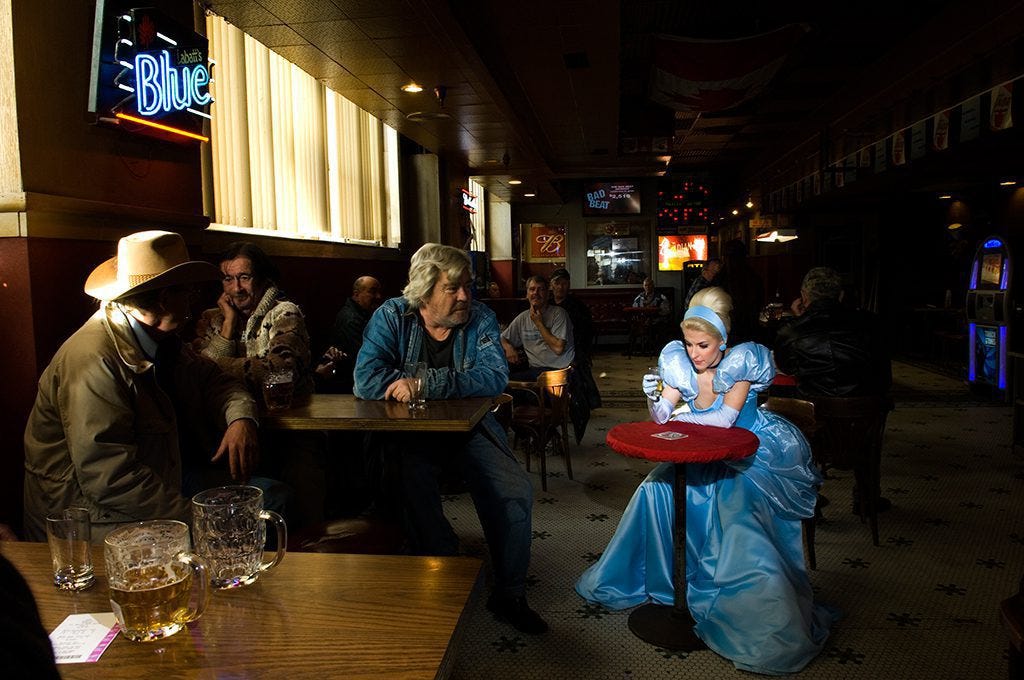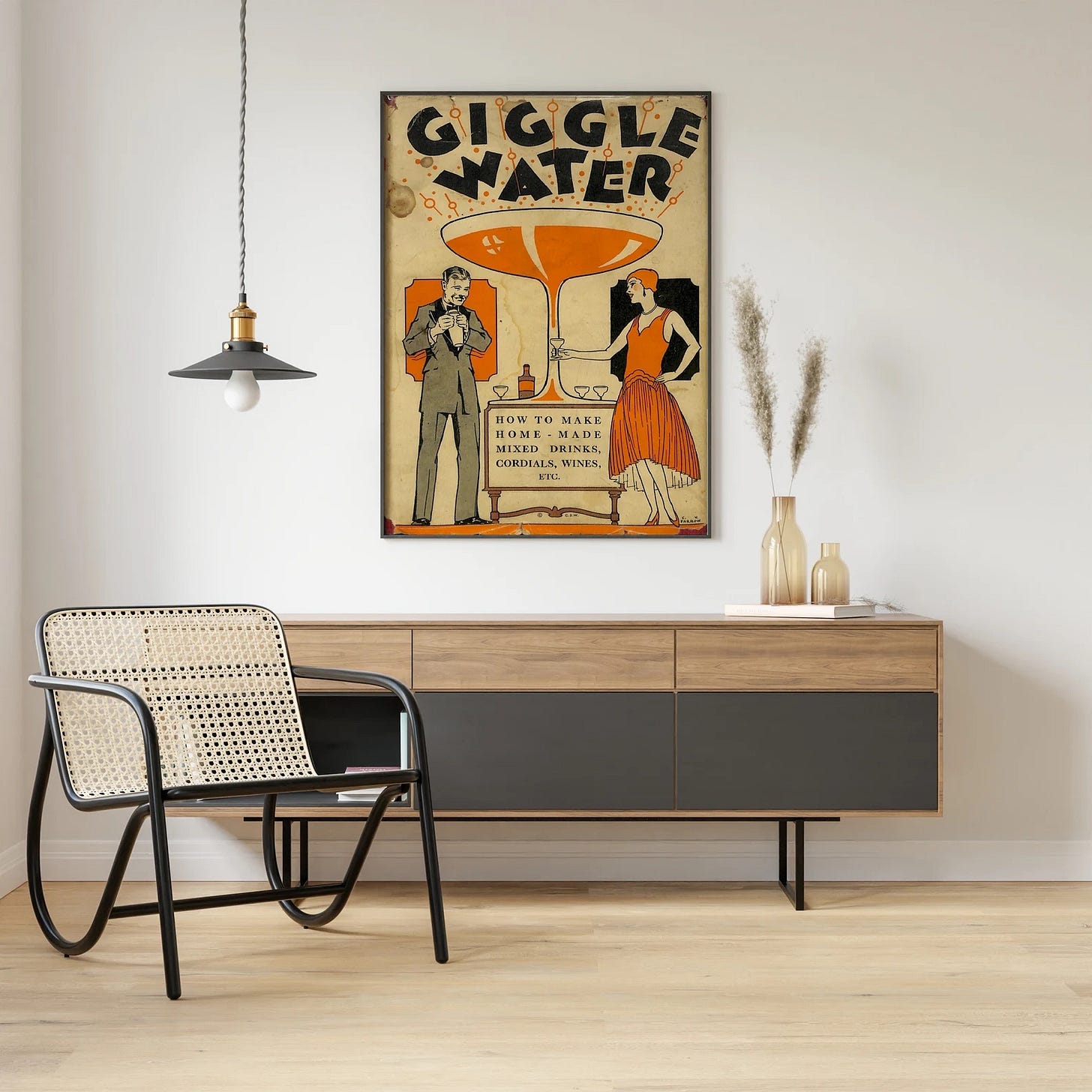Dry Parenting: How to Raise Kids Without the Liquid Crutch
Still Human: Sober, Scrappy, and Owning It
When I first became a mother, alcohol wasn’t part of my life at all. In fact, before my late twenties as a mother of four sons then, I only ever had one drink at Christmas.
But things changed as I got older. In my late twenties, I started to drink more regularly ~ beer, wine, the usual. By the time I had five children and was building my academic career, I discovered a new 'love' of prosecco.
If I had been drinking back when my first four children were little, I’d never have managed to juggle university degrees with a tribe of kids in tow. Alcohol would have held me back. But it wasn’t until later that it became a habit, a way to unwind after long days.
Like many, I found myself slowly absorbed into the culture of casual drinking. Pushing my bottle clanking supermarket trolley down aisles lined with alcohol, the ease of popping open a bottle in the evening, it became normal.
Over time, I went from being a rare drinker to pouring a glass of wine most nights, with ‘bubbles’ feeling as familiar as lemonade. And while spirits were never on the menu (cocktails ended in mess), wine was. I thought this was all normal ~ hangovers, laughing about a night I couldn’t fully recall, the blurry line between fun and forgetting.
I now understand that I was a gray area drinker. Gray area drinking exists between occasional drinking and alcoholism. It’s when someone has a regular drinking habit but doesn’t fit the stereotypical image of alcohol abuse. I wasn’t dependent on alcohol (I hoped), but my daily wine habit crept up on me, slowly numbing my emotional availability as a parent.
I appeared to have control, but the truth was, I was far from present.
The Subtle Shift into Numbness
My eldest five of ten children knew a version of me that didn’t drink regularly. As I started including alcohol in my evenings, my parenting changed.
I wasn't a heavy drinker (in my view at the time, but that doesn’t mean others felt the same way), and even one glass affected me. By the time the “witching hour” hit around 6 p.m., when I’d cook dinner with a bottle of wine open, I was there in body but semi absent in spirit.
My ability to respond to my kids’ questions, especially those from my teens, was dulled. The emotional connection I wanted to give them was filtered through a haze. It’s something I, and they, can never get back ~ deep safety, the full expression of love I felt but didn’t articulate well enough.
In 2019, after a particularly heavy night with friends, I hit a wall. I was tired of waking up at 3 a.m., hating myself. Tired of numbing instead of living. I was also tired of juggling ten kids, including little triplets. I said, “fuck this, I can’t carry on killing myself”. I was in a theatrical come-down from too much drip drip of booze.
I made a decision. I removed alcohol from my life, cold turkey, no gradual tapering. I didn’t tell anyone. I just stopped. And from that day to this, I haven’t had a drink.
The Quiet Beginnings of Sobriety
Those early days were not marked by any grand revelation or immediate struggle. I didn’t ‘announce’ my move to become sober, because the less attention I drew to it, the less pressure I felt. I kept myself busy, filling the evenings that once revolved around wine with new habits.
My kids didn’t seem to notice at first, perhaps thinking I’d go back to drinking.
What surprised me most was how quietly I transitioned into this new life. There was no dramatic shift, just a gradual reclaiming of my evenings, my clarity, and my sense of self.
Sobriety Changed Everything, Slowly
Sobriety didn’t hand me a new parenting style overnight.
There’s a difference between using energy to manage the shift from drinking to not drinking, and living fully as a sober person.
Over time, I began to notice the changes. Being sober gave me presence, not just physically, but emotionally. I could be there for my kids in ways I hadn’t been while drinking. I was steadier.
But the biggest gift sobriety gave me was time. Without the evening fog of alcohol, I gained clarity, space, and energy. I created more, wrote more, and laughed more. I also slept better, which made me more resilient and patient.
Slowly, I met myself square on and, for the first time, learned to truly like who I was. The toxicity I had poured into myself was fuelling a self-hatred that had seeped into my parenting. Once I stopped numbing, I stopped running from the discomfort, and in turn, I became a better parent, a better person.
The Side Effects of Dry Parenting
In quitting, I had to confront my own fragilities, excavating internal pain and the self-loathing that led me to dismantle my own self-preservation. I had to reckon with why I maintained this dangerous entanglement, even after it had proven harmful, perhaps because it was harmful.
I faced the irrefutable truth that my body is not a coffin for pain to be buried in.
Sometimes I still crave a break from myself, alcohol once gave me that escape. Now, I’ve had to meet myself with more compassion than I ever thought possible. Forgiveness is a journey, and while I’ve asked for it from those I hurt, most of all, I’ve had to forgive myself.
(Side note: Sober sex? That deserves its own essay1. The question of “who will I be without booze-fuelled bravado” haunted me in my earlier sober days.)
The Pain of Breaking from the “Wine Mum” Culture
Becoming sober wasn’t just about shifting my internal world, it had consequences in my social life too.
I lost a close friend when I gave up drinking (story here). We had enjoyed boozy evenings together, but when I chose sobriety, she chose to distance herself. She was uncomfortable with my decision, unable to be around a sober version of me, even though I didn’t mind her drinking. It hurt.
The part I’ve not spoken about before? That this friend kept pressurising me to have a drink. Boring for us both, right?
Wine culture has wrapped itself tightly around motherhood. We’re told that wine is the antidote to the chaos, the saviour after a long day.
But this culture does mothers a disservice. Motherhood is both brutal and beautiful, and numbing ourselves to cope with the hard parts only robs us of the ability to fully embrace the good parts too.
There was a time when I believed I deserved that glass of wine after a long day. Now I know I deserve more. I deserve to be fully present, fully engaged with my life and my children, without anything that dulls the edges.
What I Want Other Parents to Know
If you’re a parent considering sobriety, or feeling stuck in the “liquid crutch,” here’s what I want you to know: Alcohol gives you false hope. It feels like a solution to stress, exhaustion, or pressure, but it creates more harm than good.
I wish I had never leaned into prosecco as a way to escape. I wish I had realised sooner that being absent through alcohol isn’t the same as being present.
Yes, you may be there physically, but alcohol takes you away from your children emotionally. One sip doesn’t cause the damage, but as the glasses multiply, so does your absence.
We don’t fully know the impact this has on our kids. We can guess. We can regret the things we said or did when we were drinking. But repairing that damage takes time and effort. And it takes the willingness to unpack what really happened while we were numbing ourselves. I’ve not done this fully yet. It’s a big job.
A New Kind of Presence
Sobriety is not a magic fix, it’s a daily choice. But it’s one that allows you to show up, fully awake, fully aware.
It’s a choice that lets you rewrite the story, not just for yourself, but for your children.
I stopped drinking so I could live my life, not just survive it. And I think my children deserve that version of me. The one who’s present, not just in body, but in heart, mind, and soul.
So that’s where I am now ~ sober, present, and still figuring it out as I go. Parenting without alcohol is a different kind of challenge, but it’s also a gift that keeps unfolding.
If you're on a similar path, I’d love to know what resonates with you. Or maybe you’re just starting to ask the hard questions, either way, I hope you’ll be part of this open conversation.
Until next time, take it one day at a time.
Danusia xx
Recommended Substacks on Sobriety and Parenting
Here are Substacks that offer unique perspectives on considering sobriety, and about how others approach being sober and raising kids, and from people in recovery.
Huge thanks to of for her labour of love in creating a directory of sober newsletters.
Take your pick:
, , , , , , , , , , , , , , , , , , ,“Without Alcohol: How do I fuck?” Shall I write this? Let me know.









Hearing that you lost a friend over making yourself a better parent hurts my heart. I took a several months break from alcohol at one point, and one of my dearest friends told me to “call [her] when I’m drinking again so we can hang out.” I hadn’t realized alcohol was facilitating our friendship.
great post - and thanks for the shout out!! awesome story you have. much love to you on your journey!